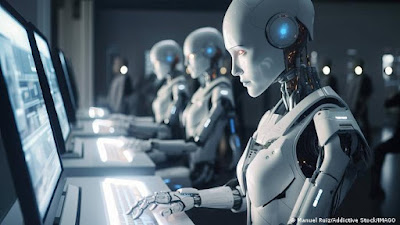“Labor market transformations in light of artificial intelligence: opportunities and challenges”
Artificial Intelligence (AI) is one of the most prominent technological developments that we have witnessed in recent years, and it has begun to play a vital role in the transformation of many sectors and industries. Many wonder how this technological advancement will affect the future of work and the labor market in general.
1. Integration of artificial intelligence into daily operations:
With its ability to quickly analyze data and make intelligence-based decisions, AI is increasingly integrated into businesses' daily operations. AI helps improve efficiency and accuracy in many areas, leading to improved productivity and reduced human errors.2. Shift in job requirements:
Advanced technologies are shifting labor market demands, as the demand for technical skills and a deep understanding of artificial intelligence increases. It has become necessary for employees to develop their skills to be compatible with modern technology, such as understanding programming and data analysis.3 Creation and destruction of functions:
Despite the clear benefits that AI offers, it raises concerns about the loss of some jobs that used to rely heavily on human labor. This opens the debate on how to manage the impact of A on the labor market and how to direct this technology to achieve economic and social benefits.4. Ethics and regulatory challenges:
As the use of artificial intelligence increases, ethical and legal challenges arise regarding privacy and security. Society, governments and businesses must work together to develop a legal and ethical framework that balances technological progress with individual rights.5. Challenges of balancing security and innovation:
As artificial intelligence develops, security and privacy challenges arise. A strong framework needs to be in place to protect user data and ensure the security of the systems themselves, while encouraging innovation.6. Impact on economic classes:
The adoption of technology and artificial intelligence can have a direct impact on the distribution of wealth and economic opportunity. Governments and institutions need to strike a balance that ensures the benefits are distributed fairly.7. Market readiness for change:
Effective labor market transformation requires rapid preparation and adaptation. Workers and employers need to look ahead and take measures to avoid economic distortions.8. Ethics of artificial intelligence:
The use of artificial intelligence raises ethical questions about machines' decisions and their impact on everyday life. An ethical framework must be established to ensure that technology is used in a way that preserves societal values.In the face of these challenges and changes, it is necessary to activate continuous learning and integration between human and technological capabilities. Managing the transformation wisely will contribute to creating a sustainable and advanced business environment that benefits positively from the capabilities of artificial intelligence.
The impact of artificial intelligence on the future of work poses increasing challenges and opportunities. Communities and companies need to think seriously about how to integrate this technology effectively, while maintaining the ability to deskill the workforce and direct the technologies towards sustainable and inclusive development.


No comments:
Post a Comment